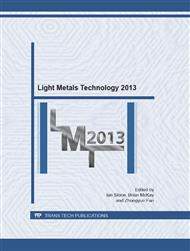p.721
p.726
p.731
p.736
p.741
p.746
p.751
p.756
p.761
Friction Stir Processing in Wrought and Cast Aluminum Alloys
Abstract:
Friction Stir Processing (FSP) of various aluminium alloys including wrought 6061 and cast A356, 319, and A390 have been systematically investigated in this study. The effects of processing on microstructure, hardness, tensile properties, and fatigue crack growth behaviour of the alloys were studied. The alloys were judiciously selected to understand the effects of Si level, type, and morphology, and to evaluate the contributions of different secondary phases and strengthening precipitates. Individual and combined effects of these microstructural features were also assessed. The results will be presented and discussed.
Info:
Periodical:
Pages:
741-745
DOI:
Citation:
Online since:
July 2013
Authors:
Price:
Сopyright:
© 2013 Trans Tech Publications Ltd. All Rights Reserved
Share:
Citation:


